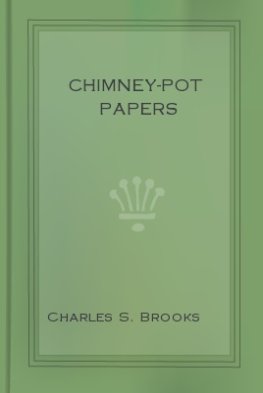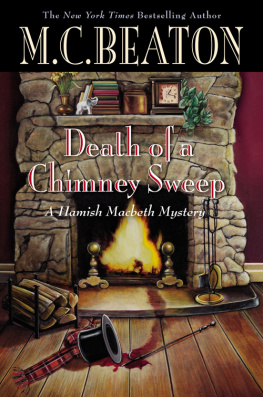Charles Brooks - Chimney-Pot Papers
Here you can read online Charles Brooks - Chimney-Pot Papers full text of the book (entire story) in english for free. Download pdf and epub, get meaning, cover and reviews about this ebook. City: London, year: 1920, publisher: New Haven: Yale University Press, genre: Humor. Description of the work, (preface) as well as reviews are available. Best literature library LitArk.com created for fans of good reading and offers a wide selection of genres:
Romance novel
Science fiction
Adventure
Detective
Science
History
Home and family
Prose
Art
Politics
Computer
Non-fiction
Religion
Business
Children
Humor
Choose a favorite category and find really read worthwhile books. Enjoy immersion in the world of imagination, feel the emotions of the characters or learn something new for yourself, make an fascinating discovery.
- Book:Chimney-Pot Papers
- Author:
- Publisher:New Haven: Yale University Press
- Genre:
- Year:1920
- City:London
- Rating:5 / 5
- Favourites:Add to favourites
- Your mark:
- 100
- 1
- 2
- 3
- 4
- 5
Chimney-Pot Papers: summary, description and annotation
We offer to read an annotation, description, summary or preface (depends on what the author of the book "Chimney-Pot Papers" wrote himself). If you haven't found the necessary information about the book — write in the comments, we will try to find it.
Chimney-Pot Papers — read online for free the complete book (whole text) full work
Below is the text of the book, divided by pages. System saving the place of the last page read, allows you to conveniently read the book "Chimney-Pot Papers" online for free, without having to search again every time where you left off. Put a bookmark, and you can go to the page where you finished reading at any time.
Font size:
Interval:
Bookmark:
Charles S. Brooks
Chimney-Pot Papers
To Minerva, my Wife
 1920New Haven: Yale University Press.London: Humphrey Milford: Oxford University PressCopyright, 1919, by Yale University Press.First published, 1919.Second printing, 1920.Publisher's Note:The Yale University Press makes gratefulacknowledgment to the Editors of theUnpopular Review and The Century Magazinefor permission to include in thepresent volume, essays of which they werethe original publishers.
1920New Haven: Yale University Press.London: Humphrey Milford: Oxford University PressCopyright, 1919, by Yale University Press.First published, 1919.Second printing, 1920.Publisher's Note:The Yale University Press makes gratefulacknowledgment to the Editors of theUnpopular Review and The Century Magazinefor permission to include in thepresent volume, essays of which they werethe original publishers. THE CHIMNEY-POTS
 y windows look across the roofs of the crowded city and my thoughts often take their suggestion from the life that is manifest at my neighbors' windows and on these roofs.
y windows look across the roofs of the crowded city and my thoughts often take their suggestion from the life that is manifest at my neighbors' windows and on these roofs.
Across the way, one story lower than our own, there dwells "with his subsidiary parents" a little lad who has been ill for several weeks. After his household is up and dressed I regularly discover him in bed, with his books and toys piled about him. Sometimes his knees are raised to form a snowy mountain, and he leads his paper soldiers up the slope. Sometimes his kitten romps across the coverlet and pounces on his wriggling toes; and again sleeps on the sunny window-sill. His book, by his rapt attention, must deal with far-off islands and with waving cocoanut trees. Lately I have observed that a yellow drink is brought to him in the afternoona delicious blend of eggs and milkand by the zest with which he licks the remainder from his lips, it is a prime favorite of his. In these last few days, however, I have seen the lad's nose flat and eager on the window, and I know that he is convalescent.
At another set of windowsnow that the days are growing short and there is need of lightsI see in shadowgraph against the curtains an occasional domestic drama. tonight, by the appearance of hurry and the shifting of garments, I surmise that there is preparation for a party. Presently, when the upstairs lights have disappeared, I shall see these folk below, issuing from their door in glossy raiment. My dear sir and madame, I wish you an agreeable dinner andif your tooth resembles mineice-cream for dessert.
The window of a kitchen, also, is opposite, and I often look on savory messes as they ripen on the firea stirring with a long iron spoon. This spoon is of such unusual length that even if one supped with the devil (surely the fearful adage cannot apply to our quiet street) he might lift his food in safety from the common pot.
A good many stories lower there is a bit of roof that is set with wicker furniture and a row of gay plants along the gutter. Here every afternoon exactly at sixthe roof being then in shadowa man appears and reads his evening paper. Later his wife joins him and they eat their supper from a tray. They are sunk almost in a well of buildings which, like the hedge of a fairy garden, shuts them from all contact with the world. And here they sit when the tray has been removed. The twilight falls early at their level and, like cottagers in a valley, they watch the daylight that still gilds the peaks above them.
There is another of these out-of-door rooms above me on a higher building. From my lower level I can see the bright canvas and the side of the trellis that supports it. Here, doubtless, in the cool breeze of these summer evenings, honest folk sip their coffee and watch the lights start across the city.
Thus, all around, I have glimpses of my neighborsa form against the curtainsa group, in the season, around the firethe week's darning in a rockeran early nose sniffing at the open window the morning airs.
But it is these roofs themselves that are the general prospect.
Close at hand are graveled surfaces with spouts and whirling vents and chimneys. Here are posts and lines for washing, and a scuttle from which once a week a laundress pops her head. Although her coming is timed to the very houralmost to the minuteyet when the scuttle stirs it is with an appearance of mystery, as if one of the forty thieves were below, boosting at the rocks that guard his cave. But the laundress is of so unromantic and jouncing a figure that I abandon the fancy when no more than her shoulders are above the scuttle. She is, however, an amiable creature and, if the wind is right, I hear her singing at her task. When clothespins fill her mouth, she experiments with popular tunes. One of these wooden bipeds once slipped inside and nearly strangled her.
In the distance, on the taller buildings, water tanks are lifted against the sky. They are perched aloft on three fingers, as it were, as if the buildings were just won to prohibition and held up their water cups in the first excitement of a novice to pledge the cause. Let hard liquor crouch and tremble in its rathskeller below the sidewalk! In the basement let musty kegs roll and gurgle with hopeless fear! Der Tag! The roof, the triumphant roof, has gone dry.
This range of buildings with water tanks and towers stops my gaze to the North. There is a crowded world beyondrolling valleys of humanitythe heights of Harlembut although my windows stand on tiptoe, they may not discover these distant scenes.
On summer days these roofs burn in the sun and spirals of heat arise. Tar flows from the joints in the tin. Tar and the adderis it not a bright day that brings them forth? Now washing hangs limp upon the line. There is no frisk in undergarments. These stockings that hang shriveled and anmiccan it be possible that they once trotted to a lively tune, or that a lifted skirt upon a crosswalk drew the eye? The very spouts and chimneys droop in the heavy sunlight. All the spinning vents are still. On these roofs, as on a steaming altar, August celebrates its hot midsummer rites.
But in winter, when the wind is up, the roofs show another aspect. The storm, in frayed and cloudy garment, now plunges across the city. It snaps its boisterous fingers. it pipes a song to summon rowdy companions off the sea. The whirling vents hum shrilly to the tune. And the tempests are roused, and the windy creatures of the hills make answer. The towerseven the nearer buildingsare obscured. The sky is gray with rain. Smoke is torn from the chimneys. Down below let a fire be snug upon the hearth and let warm folk sit and toast their feet! Let shadows romp upon the walls! Let the andirons wink at the sleepy cat! Cream or lemon, two lumps or one. Here aloft is brisker business. There is storm upon the roof. The tempest holds a carnival. And the winds pounce upon the smoke as it issues from the chimney-pots and wring it by the neck as they bear it off.
And sometimes it seems that these roofs represent youth, and its purpose, its ambition and adventure. For, from of old, have not poets lived in garrets? And are not all poets young even if their beards are white? Round and round the poet climbs, up these bare creaking flights to the very top. There is a stove to be lightedunless the woodbox failsa sloping ceiling and a window huddled to the floor. The poet's fingers may be numb. Although the inkpot be full, his stomach may be empty. And yet from this window, lately, a poem was cast upward to the moon. And youth and truth still rhyme in these upper rooms. Linda's voice is still the music of a sonnet. Still do the roses fade, and love is always like the constant stars. And once, this!surely from a garret:
When I behold, upon the night's starr'd face,
Huge cloudy symbols of a high romance,
And think that I may never live to trace
Their shadows, with the magic hand of chance
Poor starved wretches are we who live softly in the lower stories, although we are fat of body.
If a mighty pair of shears were to clip the city somewhere below these windy gutters would there not be a dearth of poems in the spring? Who then would be left to note the changing colors of the twilight and the peaceful transit of the stars? Would gray beech trees in the winter find a voice? Would there still be a song of water and of wind? Who would catch the rhythm of the waves and the wheat fields in the breeze? What lilts and melodies would vanish from the world! How stale and flat the city without its roofs!
Font size:
Interval:
Bookmark:
Similar books «Chimney-Pot Papers»
Look at similar books to Chimney-Pot Papers. We have selected literature similar in name and meaning in the hope of providing readers with more options to find new, interesting, not yet read works.
Discussion, reviews of the book Chimney-Pot Papers and just readers' own opinions. Leave your comments, write what you think about the work, its meaning or the main characters. Specify what exactly you liked and what you didn't like, and why you think so.











